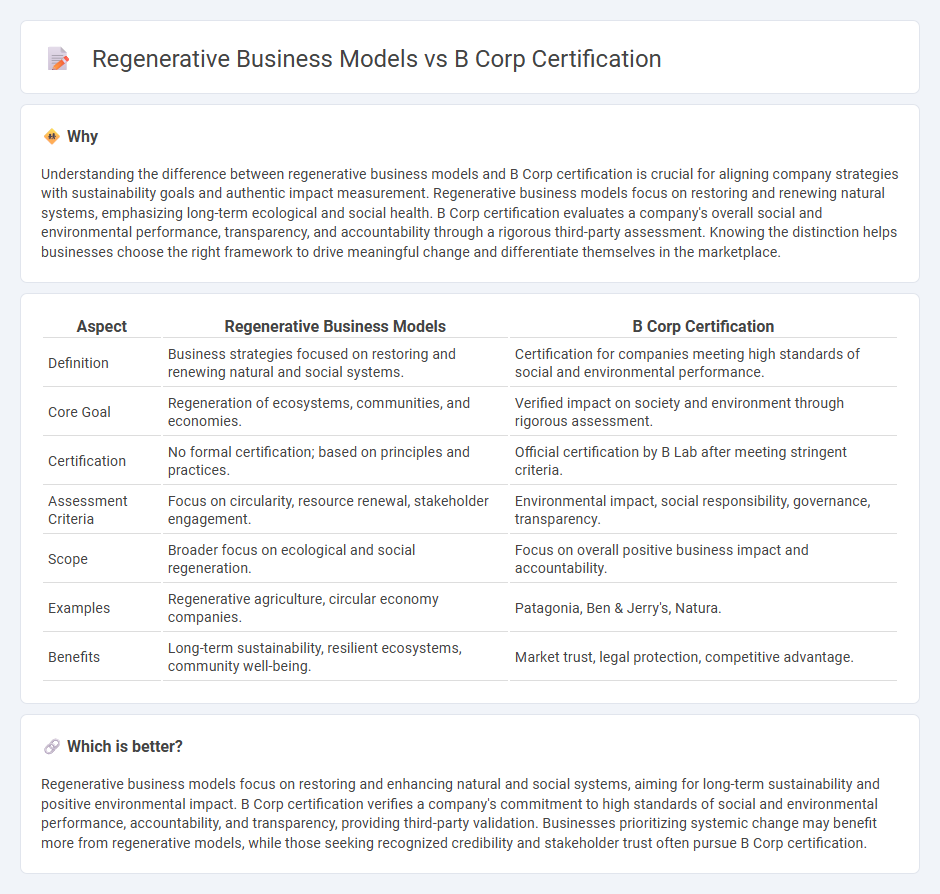
Regenerative business models prioritize restoring and enhancing natural ecosystems while driving economic growth, aligning ecological health with corporate profitability. B Corp certification evaluates companies based on rigorous social and environmental performance standards, transparency, and accountability, ensuring a verified commitment to sustainability. Explore how these frameworks can transform your business into a force for positive impact.
Why it is important
Understanding the difference between regenerative business models and B Corp certification is crucial for aligning company strategies with sustainability goals and authentic impact measurement. Regenerative business models focus on restoring and renewing natural systems, emphasizing long-term ecological and social health. B Corp certification evaluates a company's overall social and environmental performance, transparency, and accountability through a rigorous third-party assessment. Knowing the distinction helps businesses choose the right framework to drive meaningful change and differentiate themselves in the marketplace.
Comparison Table
| Aspect | Regenerative Business Models | B Corp Certification |
|---|---|---|
| Definition | Business strategies focused on restoring and renewing natural and social systems. | Certification for companies meeting high standards of social and environmental performance. |
| Core Goal | Regeneration of ecosystems, communities, and economies. | Verified impact on society and environment through rigorous assessment. |
| Certification | No formal certification; based on principles and practices. | Official certification by B Lab after meeting stringent criteria. |
| Assessment Criteria | Focus on circularity, resource renewal, stakeholder engagement. | Environmental impact, social responsibility, governance, transparency. |
| Scope | Broader focus on ecological and social regeneration. | Focus on overall positive business impact and accountability. |
| Examples | Regenerative agriculture, circular economy companies. | Patagonia, Ben & Jerry's, Natura. |
| Benefits | Long-term sustainability, resilient ecosystems, community well-being. | Market trust, legal protection, competitive advantage. |
Which is better?
Regenerative business models focus on restoring and enhancing natural and social systems, aiming for long-term sustainability and positive environmental impact. B Corp certification verifies a company's commitment to high standards of social and environmental performance, accountability, and transparency, providing third-party validation. Businesses prioritizing systemic change may benefit more from regenerative models, while those seeking recognized credibility and stakeholder trust often pursue B Corp certification.
Connection
Regenerative business models prioritize environmental restoration and social equity, aligning closely with B Corp certification criteria that assess a company's overall positive impact. B Corp certification validates a commitment to sustainable practices, transparency, and accountability, which are fundamental principles of regenerative enterprises. Consulting services often guide organizations through adopting regenerative strategies and achieving B Corp status to enhance long-term resilience and stakeholder trust.
Key Terms
Triple Bottom Line
B Corp certification ensures companies meet rigorous standards of social and environmental performance, accountability, and transparency, aligning with the Triple Bottom Line framework emphasizing People, Planet, and Profit. Regenerative business models go beyond sustainability by actively restoring ecosystems, enhancing social equity, and fostering economic resilience to create a net-positive impact. Explore how integrating B Corp principles with regenerative practices drives transformative change in business.
Regeneration
B Corp certification assesses companies based on social and environmental performance, transparency, and accountability, promoting responsible business practices. Regenerative business models go beyond sustainability by restoring and renewing natural and social systems through innovative, circular, and restorative approaches. Explore how integrating regenerative principles can transform your business for lasting ecological and community impact.
Impact Assessment
B Corp certification emphasizes rigorous impact assessment through standards measuring social and environmental performance, accountability, and transparency, ensuring businesses meet verified criteria for positive impact. Regenerative business models prioritize continuous restoration and enhancement of natural and social systems, using holistic impact assessment frameworks to evaluate long-term ecological and community benefits. Explore detailed comparisons to understand how each approach drives sustainable business transformation.
Source and External Links
B Corporation (certification) - Wikipedia - B Corp certification requires a company to complete an online assessment scoring at least 80 out of 200 points on social and environmental performance, commit to stakeholder governance, and adapt their legal structure according to B Lab rules; the certification evaluates governance, workers, community, environment, and product impact.
B Corp Certification - B Lab - The certification process includes a Disclosure Questionnaire, Impact Assessment submission, eligibility evaluation, verification including documentation review and calls, culminating in signing the B Corp Agreement and publishing a public impact report if scoring over 80 points.
Small business B corp basics: Requirements & costs - Human Interest - To qualify for B Corp certification, companies take a free assessment focusing on impact across employees, customers, community, and environment, must score 80+, and pay annual fees ranging from $500 for revenues under $500,000 up to $50,000 for revenues over $1 billion to maintain certification.
 dowidth.com
dowidth.com